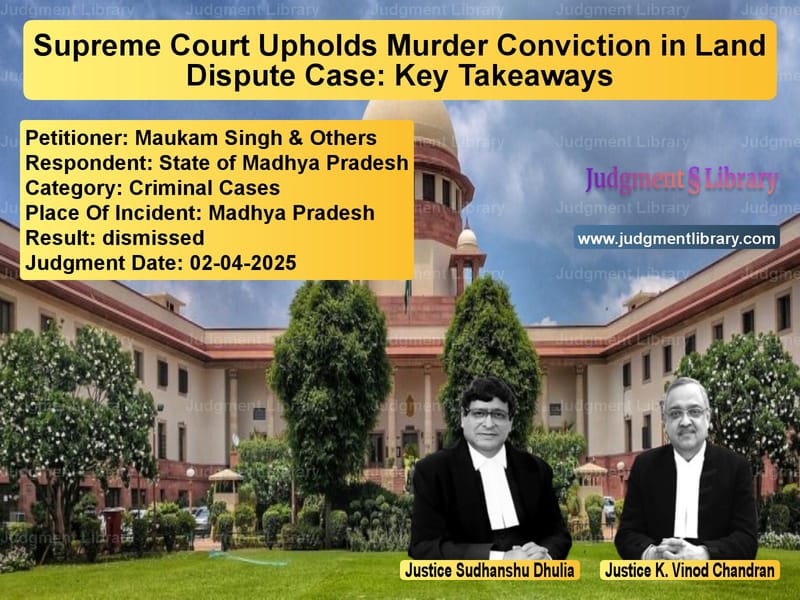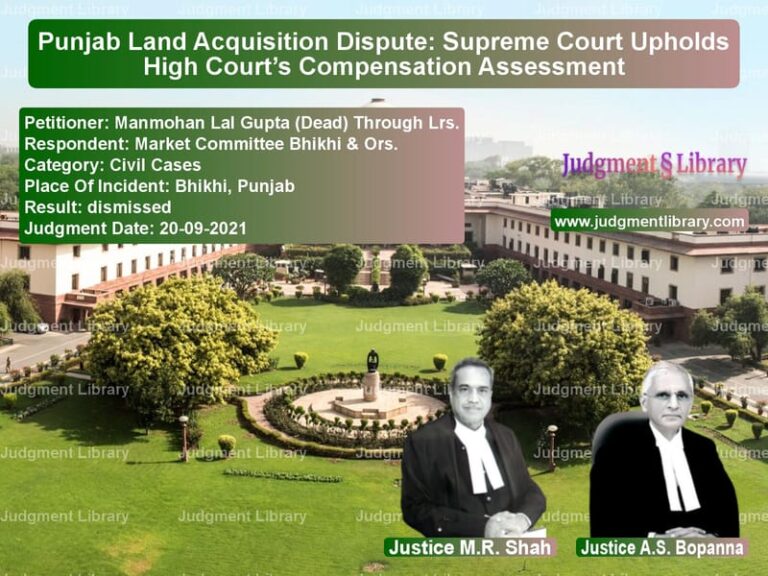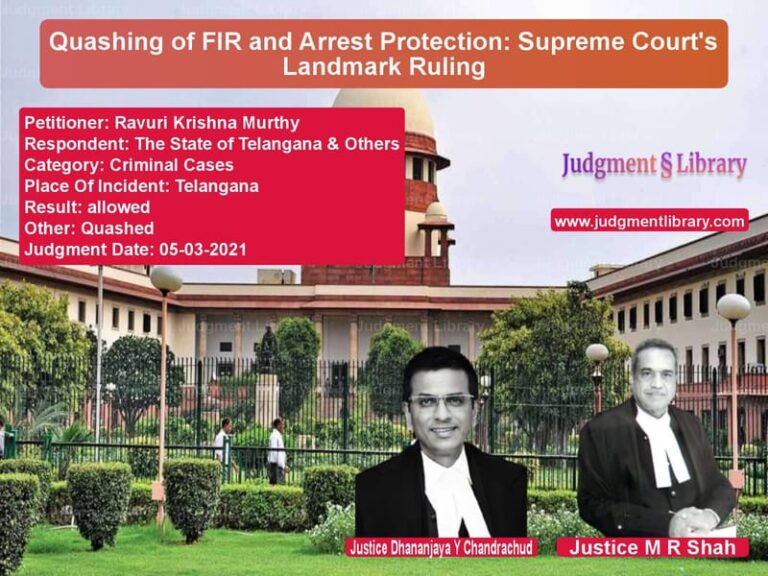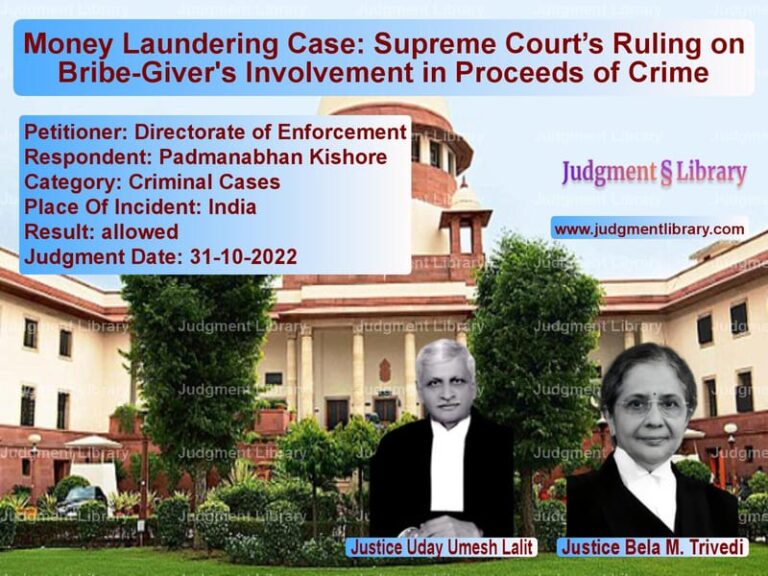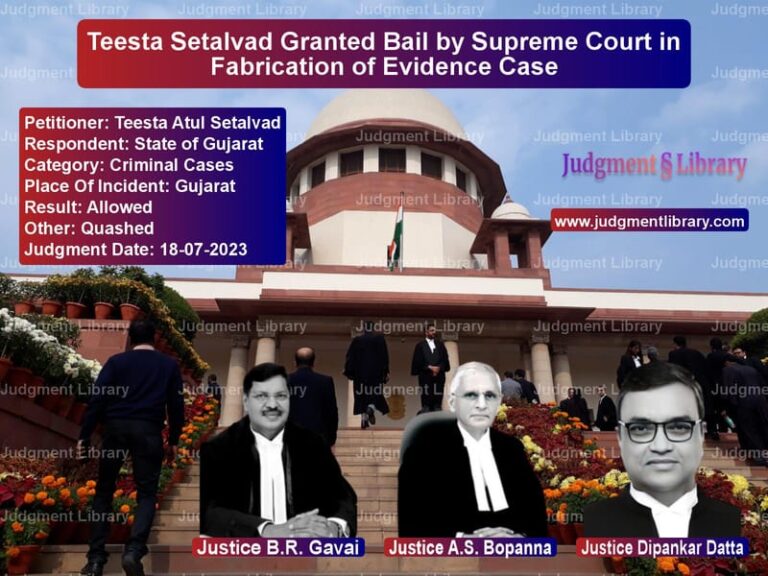Supreme Court Upholds Murder Conviction in Land Dispute Case: Key Takeaways
The Supreme Court of India recently delivered a significant judgment upholding the murder conviction of three accused in a case stemming from a land dispute in Madhya Pradesh. The case involved a violent altercation that resulted in the death of an elderly man and injuries to his grandchildren. Here’s a detailed analysis of the court’s decision.
Case Background
The incident occurred when the accused, allegedly instigated by a person in possession of disputed land, confronted the deceased and his family over worship activities at the disputed property. The confrontation escalated into violence, resulting in the death of the grandfather and injuries to three grandchildren.
Key Arguments
Appellants’ Arguments (Accused)
- There was no premeditation or intention to cause death
- The fatal injury could have been caused by accidental fall
- No incised injuries were found on the deceased despite claims of cutting weapons being used
- At most, the offense should fall under Section 304 Part II (culpable homicide not amounting to murder)
Respondent’s Arguments (State of Madhya Pradesh)
- The accused trespassed into the victims’ house armed with deadly weapons
- The attack was premeditated with intention to cause death
- Ocular testimony from injured witnesses was consistent and credible
- The fact that death occurred 25 days later doesn’t change the nature of the offense
Court’s Observations
The Supreme Court made several important observations in its judgment:
“The ocular witnesses; PW’s 1 to 3, who suffered injuries in the incident spoke of the blow to the head of the deceased… When a scuffle ensues, it cannot be said that the witnesses; especially if they were actively involved in the scuffle and were also injured, would speak of the minute details of who inflicted the blow, with what weapon and precisely how it was inflicted.”
The court also noted:
“That, the accused came to the house of the deceased with the intention of questioning them regarding the visit made to the deity installed in the disputed property, has been unequivocally proved by the oral testimony of witnesses. That, the accused came to the house armed with deadly weapons also stands established which clearly points to the premeditation and the intention to cause injuries which were likely to cause death.”
Key Findings
- The court found the testimony of injured eyewitnesses (grandchildren of the deceased) credible and consistent
- Medical evidence corroborated the eyewitness accounts of injuries
- The accused were found to have trespassed into the victims’ home armed with deadly weapons (axe and cutting weapon)
- The fatal blow was delivered to the head – a vital part of the body
- The court rejected the argument that the injury could have been accidental
- The land dispute motive was established through witness testimony
Medical Evidence
The court examined the medical evidence in detail:
- The deceased suffered two head injuries – one fatal and one simple
- Fatal injury showed swelling extending from left side of head to middle of scalp
- Blood was oozing from left ear and both nostrils
- Doctor testified the fatal injury could be caused by hard blunt object or fall
- Injuries to grandchildren matched their testimonies about the attack
Court’s Decision
The Supreme Court upheld the conviction under Section 302 (murder) read with Section 34 (common intention) of IPC, stating:
“The severity of the injury, caused by a blow to the head, definitely resulted in the death; though after a few days, as deposed by the Doctor… We find no reason to interfere with the conviction and sentence imposed on the accused.”
The court dismissed the appeal and directed:
- Appellants to surrender before Sessions Court within two weeks
- Sessions Court to take appropriate steps if they fail to surrender
- All pending applications stand disposed
Conclusion
This judgment reinforces important legal principles regarding:
- The credibility of injured eyewitnesses
- Assessment of medical evidence in relation to eyewitness accounts
- Establishment of common intention in group offenses
- Differentiation between murder and culpable homicide
The court’s detailed analysis of the evidence and its rejection of the accidental injury theory provides important guidance for similar cases involving violent disputes resulting in death.
Petitioner Name: Maukam Singh & Others.Respondent Name: State of Madhya Pradesh.Judgment By: Justice Sudhanshu Dhulia, Justice K. Vinod Chandran.Place Of Incident: Madhya Pradesh.Judgment Date: 02-04-2025.
Don’t miss out on the full details! Download the complete judgment in PDF format below and gain valuable insights instantly!
Download Judgment: maukam-singh-&-other-vs-state-of-madhya-prad-supreme-court-of-india-judgment-dated-02-04-2025.pdf
Directly Download Judgment: Directly download this Judgment
See all petitions in Murder Cases
See all petitions in Attempt to Murder Cases
See all petitions in Bail and Anticipatory Bail
See all petitions in Property Disputes
See all petitions in Fraud and Forgery
See all petitions in Judgment by Sudhanshu Dhulia
See all petitions in Judgment by K. Vinod Chandran
See all petitions in dismissed
See all petitions in supreme court of India judgments April 2025
See all petitions in 2025 judgments
See all posts in Criminal Cases Category
See all allowed petitions in Criminal Cases Category
See all Dismissed petitions in Criminal Cases Category
See all partially allowed petitions in Criminal Cases Category

